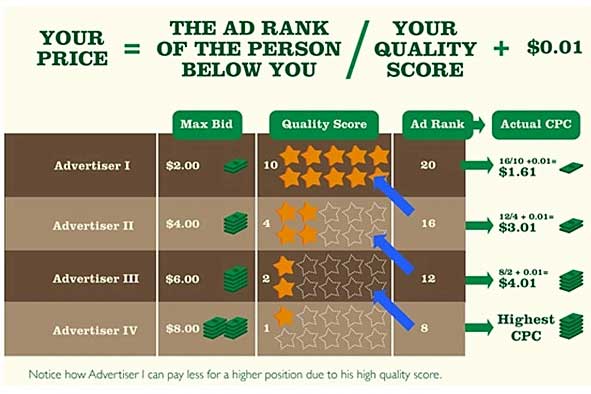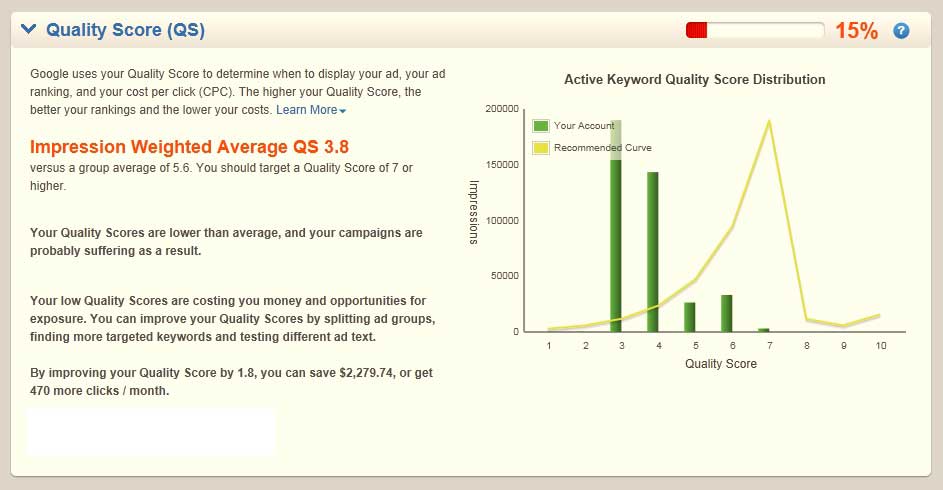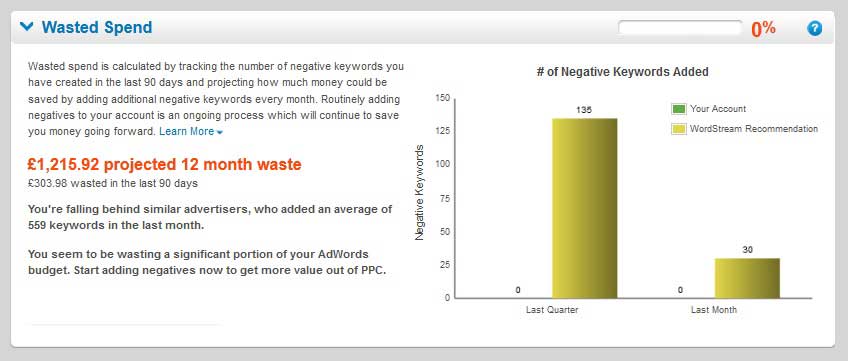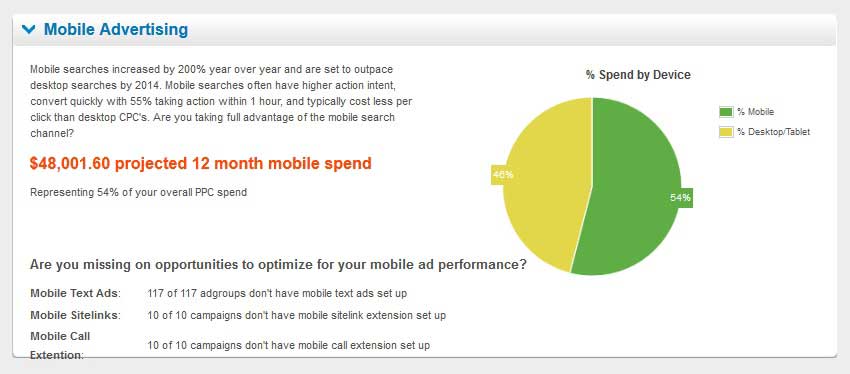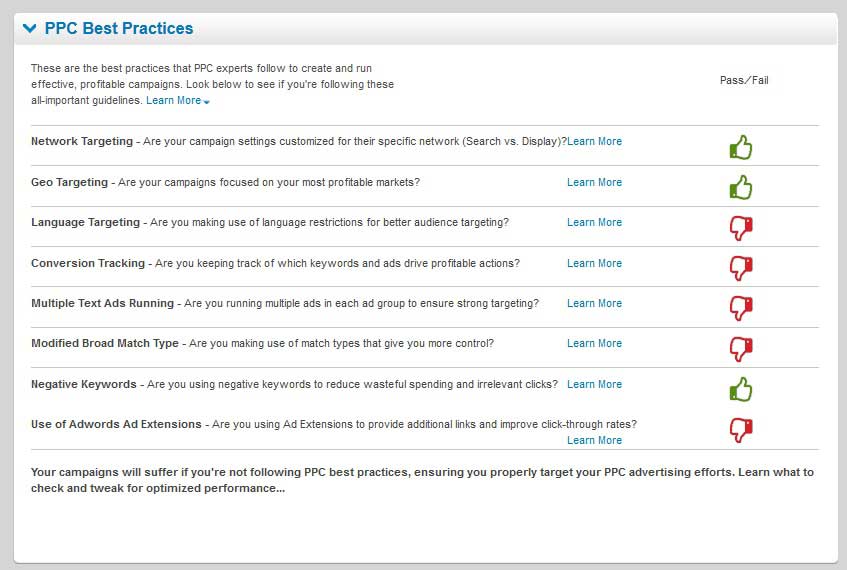In marketing—and especially data-driven channels, such as paid search—actionable insights are your best friend. For PPC advertisers, having the most relevant and recent data possible is particularly important, considering that they're competing in real time (usually with real budget constraints) for clicks.
Late in 2013, we shared the results of research that showed SMB advertisers are basically throwing approximately 25% of their AdWords budget away.
First off... stop doing that. But that's easier said than done, right?
Performing a PPC account audit is the first step toward a healthy paid search account. You can go about performing that audit by manually diving into your PPC account's data. But there are alternatives.
To analyze Google AdWords accounts and derive insights and recommendations to better optimize spend, targeting, and overall performance, WordStream (my company) developed the free AdWords Performance Grader Plus tool, which grades keywords, ads, and campaigns using an algorithm that considers more than 60 factors.
Within the reports it generates, you'll find the following five insights that are critical to your PPC success.
1. Click-Through Rate (CTR)
Click-through rate tells you the percentage of ad impressions that became clicks. A low CTR can indicate that your ads aren't resonating with searchers or that your keyword targeting is too broad.
AdWords rewards keywords/ads with high CTRs by giving them high Quality Scores, which in turn results in lower cost per click (CPC) and more prominent ad positioning. Conversely, keywords/ads that fall below the expected click through rate for a given ad spot are punished with higher CPC and less prominent ad positioning, and they are at risk of being turned off.
The performance grader plots the CTR of your top 200 keywords by average position, and overlays Google's expected click through rate so you can identify your "problem keywords" that are underperforming and need work.
2. Quality Score (QS)
The impact of Quality Score on your ad placement, ranking and cost is huge. Google uses Quality Score to measure relevance, which it determines by factoring in your ad and keyword CTRs, relevance to the search query and ad group, landing page quality, and other factors.
Improving your QS can help you increase impressions while lowering your costs per click. The image illustrates the formula Google uses to determine your actual cost per click (not your maximum CPC, but the price you actually pay). As you can see, a higher QS can actually result in a higher placement at a lesser cost.
The performance grader report charts your active keyword Quality Score distribution compared with the recommended, average Quality Score distribution specific for your industry, then offers actionable tips to help you improve:
In the image, you can see that the advertiser's average Quality Score of 3.8/10 is far below the industry average, and that the account consists of mostly keywords with Quality Scores of 3/10 and 4/10, which is a big opportunity for improvement!
3. Wasted Spend
Negative keywords allow you to exclude keywords that might lead to clicks from people that are not likely to convert; it's a critical tool for campaign success. It's an area worth spending at least a few minutes a week optimizing, as your analytics and sales data help you discover terms that draw clicks but not conversions.
This is an important metric, but difficult to gauge without help of a tool backed by industry analysis and macro-level benchmarks. AdWords Performance Tracker Plus tracks negative keyword usage and projects the impact of further optimization in this area.
For example, in the following figure, notice how an advertiser has added zero negative keywords in the last month and quarter. That is much less than the industry benchmarks that are specific to the advertiser's monthly average spend and industry.
This report provides an estimate of how much you've wasted in the last 30 days, and your projected waste over the next 12 months, based on an analysis of your account.
4. Mobile Readiness
Mobile is huge... but you knew that, right? This year, marketers will spend somewhere in the neighborhood of $13.1 billion on mobile, accounting for 27% of all digital ad spend. That's huge. But is your PPC account optimized for mobile?
In the following (shocking) example, you have an advertiser that is spending 54% of its ad budget on clicks from mobile, but it has not bothered to set up any of the mobile advertising bestppractices such as mobile ads, sitelinks, and call extensions:
You need to understand the extent of your search marketing spend that is allocated to mobile devices, and test the mobile readiness of your AdWords account.
5. Adherence to PPC Best Practices
You won't find information in Google AdWords or Analytics on your account's compliance with industry best-practices. The PPC Best Practices section of the performance grader report helps uncover opportunities to optimize your network targeting, geotargeting, conversion tracking, use of AdWords Ad Extensions, and more:
Audit and Optimize on an Ongoing Basis
Remember, AdWords is a live auction and can change quickly; if you're not keeping on top of your account, you can bet your competitors will outpace you.
Ideally, you should audit your account weekly or biweekly, with management and optimization happening on a daily basis—even if only for a few minutes.
* * *
Which insights matter most to you when gauging the success of your PPC campaigns? Share your thoughts below.

